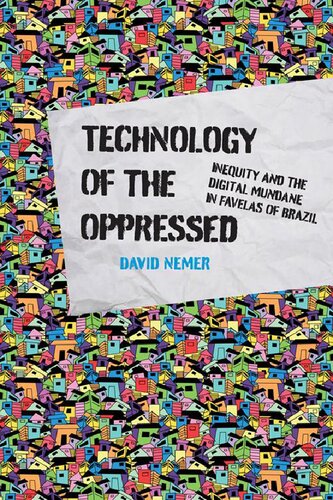

Most ebook files are in PDF format, so you can easily read them using various software such as Foxit Reader or directly on the Google Chrome browser.
Some ebook files are released by publishers in other formats such as .awz, .mobi, .epub, .fb2, etc. You may need to install specific software to read these formats on mobile/PC, such as Calibre.
Please read the tutorial at this link. https://ebooknice.com/page/post?id=faq
We offer FREE conversion to the popular formats you request; however, this may take some time. Therefore, right after payment, please email us, and we will try to provide the service as quickly as possible.
For some exceptional file formats or broken links (if any), please refrain from opening any disputes. Instead, email us first, and we will try to assist within a maximum of 6 hours.
EbookNice Team

Status:
Available0.0
0 reviews
ISBN 10: 0262368625
ISBN 13: 9780262543347
Author: David Nemer
1. Introduction
Mundane Technology: The Technology of the Oppressed
Mundane Technology as an Intersectional Approach
Favelas: The Site of Oppression
Territory of Good: Gurigica, São Benedito, Itararé, and Bairro da Penha
Race Divide: The Other Side of the Avenue
Digital Inequalities in Vitória
Positionality
2. Repairing the Broken City
Repair as Mundane Technology
Repairing the Keyboard
The Internet of the Oppressed
Mobile Mundane Technology
Mundane Technology: Resistance as Repair
3. Community Technology Centers as Mundane Technologies
Rethinking the Role of Telecenters in Communities
LAN Houses: Can a Mundane Technology Be For-Profit?
4. Social Media for Survival
Social Media: Facebook and YouTube
The Liberation of the Selfie
Breaking the Culture of Silence through Selfies
5. Proud Faveladas: Resisting Gendered Oppression in Territory of Good
Paulo Freire, Pedagogy of the Oppressed, and Feminist Criticism
CTCs as Spaces of Gender Oppression
Telecenters as Safe but Limited Spaces for Women
Digital Technologies Amplifying Gender Oppression
6. Geographies of Oppression: Uncovering Spaces of Silencing
The Social Movement of the Oppressed
Social Boundaries on Social Network Sites
The Orkutization of Shoppings
“Is it because I’m Black?”
7. Technology of the Oppressor
From June Journeys to the Rise of Bolsonaro
From Facebook to WhatsApp
The Rise of Right-Wing Extremism
The Human Infrastructure of Fake News
From Misinformation to Radicalization
Why Do Bolsonaro and the New Right Hate Paulo Freire?
8. Technology of Hope: Reliving Technology of the Oppressed
technology oppression
technology and inequality
what is technology inequality
technology of the oppressed
technology inequality
Tags: David Nemer, Technology, Digital Mundane, Brazil